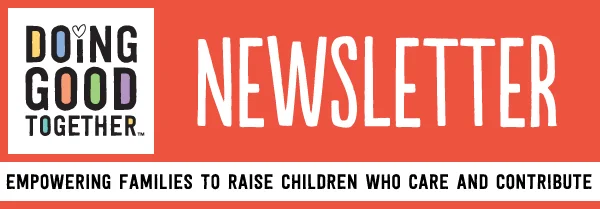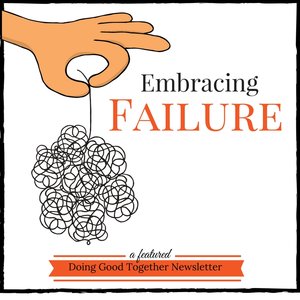EMBRACING FAILURE
I was reminded about the importance of failure after reading a blog post by Meg Conley. She said that every night at dinner, her family discusses three things: kindness, courage and failure. Kindness and courage are common topics in this newsletter, but failure deserves attention, too. I agree with researchers that accepting failure can lead to growth. And when parents view failure as an opportunity to be embraced rather than something to be avoided, kids will be more willing to take on new challenges and will develop the strength to cope. Here are strategies for helping you and your kids meet any disappointments that come your way.
-Jenny Friedman, Executive Director
FAILURE: A STEPPING STONE TO SUCCESS
Make a Difference.....
You can't schedule failure in your children's day, but you can look for opportunities to reinforce their ability to handle any letdowns.
- When children express disappointment with their performance after trying something new, empathize and remind them how much courage it took to make the attempt. Show confidence in their ability to deal with a setback. Share a time when you had a similar experience and talk about how you bounced back.
- In times of disappointment, find strategies together for dealing with the frustration. For example, discuss how failure is temporary and talk about how you might do better next time by using a different approach, asking someone for assistance -- or by trying something new altogether.
- Research indicates that kids who are praised for their effort rather than ability (and are told that practice "grows" their brains) are more likely to take on new challenges. By emphasizing hard work over innate ability, you can help your children see skills as something that can be improved with practice, perseverance, and thoughtful strategies. For example, rather than labeling your child as "smart" when they bring home a good grade, you might say: "Wow. An 'A' on your spelling test. Congratulations. You really worked hard studying those words." (Read this article by Carol Dweck for a nuanced look at nurturing a "growth mindset.")
- Find the right balance when responding to your child's blunders. Natural consequences can provide powerful learning opportunites. But, for example, if your child forgets her lunch a couple times, dropping it off on the way to work (rather than "teaching her a lesson" by having her do without) teaches that family members help one another out, and that making a mistake is nothing to be ashamed of. (Who of us hasn't relied on others for assistance because we've misplaced our keys or forgotten an essential ingredient at the grocery store?)
- Try to walk the line between advocating for your children (especially critical when kids have special needs) and rushing to "rescue" them from every disappointment or dashed expectation. Insulating children from frustration sends the message that you can't tolerate their failure -- and that you find "less than the best" impossible to accept.
- Provide plenty of unstructured play time. Free play allows children to try out ideas -- and sometimes fail along the way. If they do, they can discover on their own how to regroup and try again. In addition, play can reduce stress, improve self-control, and enhance cognitive skills, empathy and imagination.
FAILURE AS AN OPPORTUNITY TO LEARN
Talk About It.....
Help your children see failure as normal. Chatting about what you've all gotten wrong at dinner each night, as this family does, provides that assurance. (Be sure to follow up such discussions with suggestions for positive ways to move forward.) Remember, it's OK to laugh at your own failures, too!
Talk about failure as an opportunity -- and as critical to success. Ask your child what they can learn from the experience and discuss ways they might do better next time.
Share stories of well-known people who worked past their failures, such as authors whose first books were rejected by a string of editors (J.K. Rowling, Stephen King, Dr. Seuss) or whose inventions had a bumpy start (Henry Ford, Thomas Edison). Tell stories about the times you've failed as well -- and how it's made a positive impact on your life.
Learn About It.....
Flight School by Lita Judge. (Ages 4 and up). A young penguin believes he has "the soul of an eagle," but he's having trouble getting off the ground. His plucky perseverance, and a little help, make his dreams a reality.
The Most Magnificent Thing by Ashley Spires. (Ages 3 and up). Have you ever set out to make something magnificent? Have you ever had a vision but wondered how to make it a reality? Have you ever been so frustrated by a project that you decided just to quit? This charming book may help kids look at their projects from a whole new angle.
INSPIRATION
"Ever tried. Ever failed. No matter. Try Again. Fail again. Fail better."
-Samuel Beckett, Irish novelist







